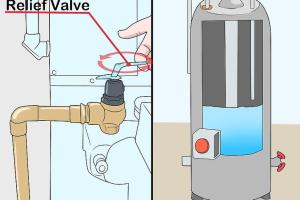Essential Guide: How to Start a Boiler Safely and Effectively

-
Quick Links:
- Introduction
- Understanding Boilers
- Types of Boilers
- Pre-Startup Checklist
- Step-by-Step Guide to Starting a Boiler
- Common Issues and Troubleshooting
- Boiler Maintenance Tips
- Case Studies
- Expert Insights
- FAQs
Introduction
Starting a boiler may seem daunting, but with the right knowledge and precautions, it can be a straightforward task. Boilers are essential for heating systems in homes and industries alike. In this guide, we will walk you through everything you need to know about starting a boiler safely and efficiently.Understanding Boilers
Boilers are devices that heat water or produce steam for heating and other applications. They are widely used in residential and commercial settings. Understanding how a boiler operates is crucial for anyone looking to start one.How Boilers Work
Boilers operate by heating water through various energy sources, including gas, oil, or electricity. The heated water or steam is then circulated through pipes to radiators or heating systems to warm spaces.Types of Boilers
There are several types of boilers, each serving different needs:- Combi Boilers: Provide hot water on demand and are space-efficient.
- System Boilers: Require a cylinder for storing hot water but do not need a water tank.
- Regular Boilers: Ideal for larger homes with multiple bathrooms, requiring a cold water tank.
- Steam Boilers: Used primarily in industrial applications, producing steam for various uses.
Pre-Startup Checklist
Before starting a boiler, ensure that you have completed the following checklist:- Check water levels in the boiler.
- Inspect the fuel supply for any leaks.
- Ensure that all valves are closed.
- Examine the flue and ventilation systems for blockages.
- Test safety devices like pressure relief valves.
Step-by-Step Guide to Starting a Boiler
Starting a boiler involves several critical steps:Step 1: Preparation
- Ensure the area around the boiler is clean and free from obstructions. - Gather necessary tools and safety equipment, including gloves and goggles.Step 2: Filling the Boiler
- Open the water supply valve to fill the boiler to the required level. This typically involves checking the pressure gauge.Step 3: Checking Fuel Supply
- Make sure the fuel source is connected and functional. For gas boilers, check for any leaks.Step 4: Ignition
- Follow the manufacturer’s instructions for ignition. This usually involves: - Turning on the power supply. - Setting the thermostat to the desired temperature. - Activating the ignition switch.Step 5: Monitoring
- Once started, monitor the boiler for any unusual sounds or leaks. - Check the pressure and temperature gauges to ensure they are within safe operating levels.Step 6: Final Checks
- After the boiler has run for a few minutes, check for proper heat distribution throughout the system.Common Issues and Troubleshooting
Even with careful operation, issues can arise. Here are some common problems and their solutions:- Low Pressure: Check for leaks in the system.
- No Heat: Ensure the thermostat is set correctly and the boiler is receiving power.
- Strange Noises: Air trapped in the system may need to be bled.
Boiler Maintenance Tips
Regular maintenance is crucial for the efficiency and longevity of your boiler. Consider the following tips:- Schedule annual professional inspections.
- Bleed radiators regularly to remove trapped air.
- Inspect and replace filters as needed.
- Monitor water levels and pressure consistently.
Case Studies
**Case Study 1: Residential Boiler Efficiency Improvement** A homeowner in Pennsylvania reported a 20% reduction in energy costs after upgrading to a high-efficiency combi boiler. The installation required careful planning and adherence to safety protocols. **Case Study 2: Industrial Steam Boiler Troubleshooting** An industrial facility faced frequent shutdowns due to low water pressure in their steam boiler system. After implementing a regular maintenance schedule and upgrading safety valves, the facility reported improved performance and reduced downtime.Expert Insights
We consulted industry experts who provided valuable insights into the importance of understanding boiler systems and adhering to safety protocols. According to John Smith, a certified HVAC technician, "Regular checks and professional maintenance are key to ensuring your boiler operates safely and efficiently."FAQs
1. What should I do if my boiler won't start?
Check the power supply, thermostat settings, and ensure the fuel supply is connected.
2. How often should I service my boiler?
It is recommended to service your boiler at least once a year.
3. Can I start my boiler if I smell gas?
No, evacuate the area and contact a professional immediately.
4. What are the signs of a faulty boiler?
Common signs include unusual noises, leaks, and inconsistent heating.
5. How can I increase my boiler's efficiency?
Regular maintenance and using thermostats effectively can improve efficiency.
6. What is the lifespan of a typical boiler?
A well-maintained boiler can last 10 to 15 years.
7. Is it safe to start a boiler myself?
As long as you follow the manufacturer's instructions and safety protocols, it is generally safe.
8. What should I do if my boiler is leaking?
Turn off the boiler and contact a professional immediately.
9. How do I know if my boiler is properly vented?
Check for clear flue ducts and ensure there are no blockages in the ventilation system.
10. Can I use my boiler during a power outage?
Most modern boilers require electricity to operate, so they may not function during a power outage.
Random Reads
- How to play copied playstation games without a modchip
- How to play dota
- How to program an xfinity remote
- How to program a video game
- How to watch tv online
- How to watch tv computer laptop tablet phone
- Simple ways to adjust self closing spring hinges
- How to screenshot print screen key
- How to screenshot in windows 10
- How to make stairs in minecraft